Home > Articles > The Archives > The Lost & Found
The Lost & Found
Reprinted from Bluegrass Unlimited Magazine
March 1978, Volume 12, Number 9
Together only four years, The Lost and Found of southwest Virginia is rapidly cutting a favorable swath across the bluegrass entertainment field with a Duke’s mixture of traditional and modern bluegrass sounds, all arranged in a distinct, creative style.
In addition to bringing musical excitement to traditional bluegrass tunes, group members have provided their own originals and borrowed from other fields to make their first two albums on Outlet Records appeal to a variety of fans in a down-home but professional manner.
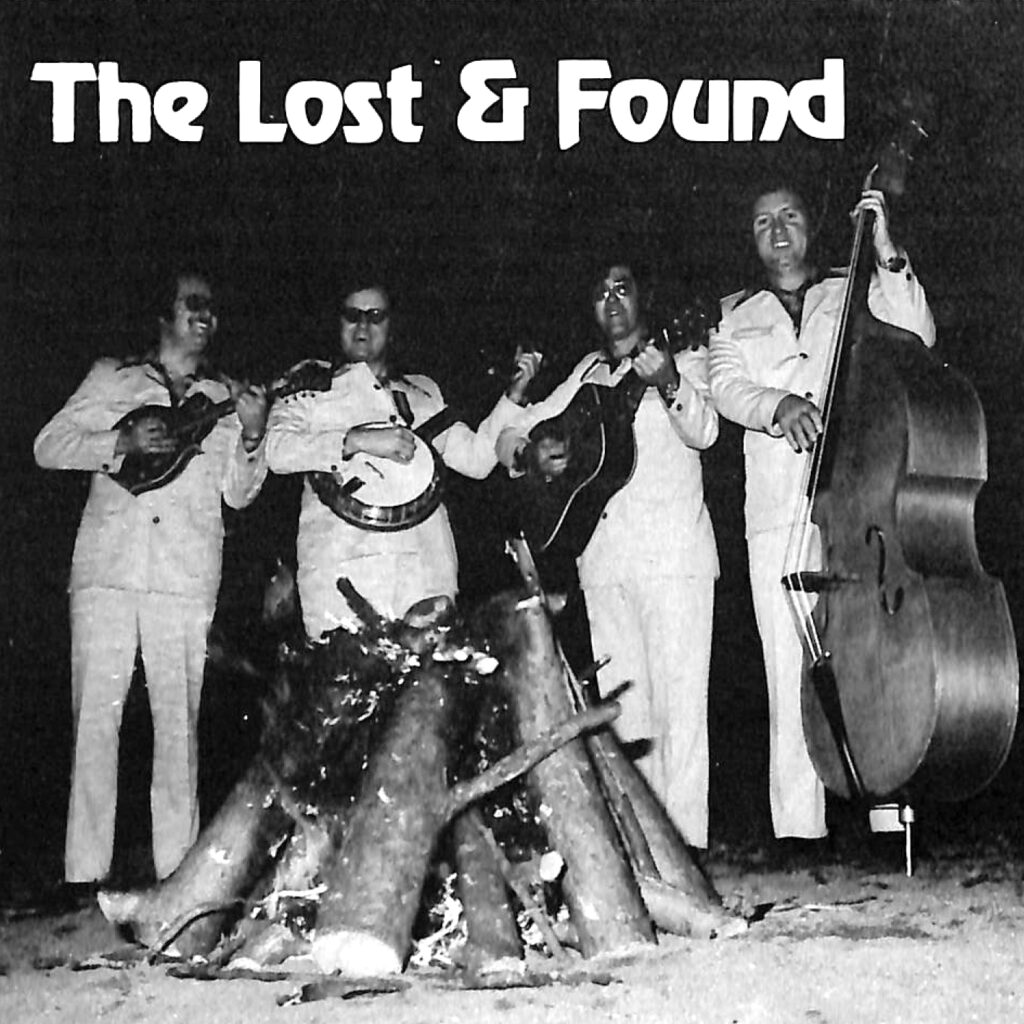
Their first single was released in November. It features “Old Slate Mountain Home,” written by the group’s Gene Parker. This is a novelty-type song with ear-ringing good sounds, affording a fine example of The Lost and Found’s close-knit harmony. The flip side offers “Last Lonely Eagle” with a slight touch of country. Both sides have earned the group a good bit of air play. A third album is tentatively scheduled for distribution in early spring this year.
Playing some 20 bluegrass festivals in the ’77 season, manager Alan Mills is thankful for the success and acceptance The Lost and Found had enjoyed in such a short time. Already scheduled for this coming season are several repeat show dates.
Mills of Ridgeway, Virginia, not only manages the group but plays stand-up bass, reaches one of the highest and clearest tenors in the business and is perhaps one of the best MCs on the festival circuit. He has paid his dues in the music business, starting public performances in 1959 in the country field.
The Lost and Found’s name actually was Mills’ idea, conceived on the way home from a jam session of four friends. They had gotten together through a mutual interest in bluegrass, after trying their hands in other bands.
This night, after deciding they sounded good enough to begin playing somewhere besides in each others’ basements, they wanted other people to hear what they could do. Mills remembers thinking that here was a good bunch of musicians who had been “lost” in other bands and had finally “found” themselves in this bluegrass niche.
They played their first shows as The Lost and Found, beginning in October of 1973, on cable television in Martinsville, Va. This continued for about two years.
Individual band members were heavy listeners to both the older musicians, Flatt and Scruggs, Bill Monroe, Stanley Brothers and Reno and Smiley, and newer groups like the Country Gentlemen and Seldom Scene.
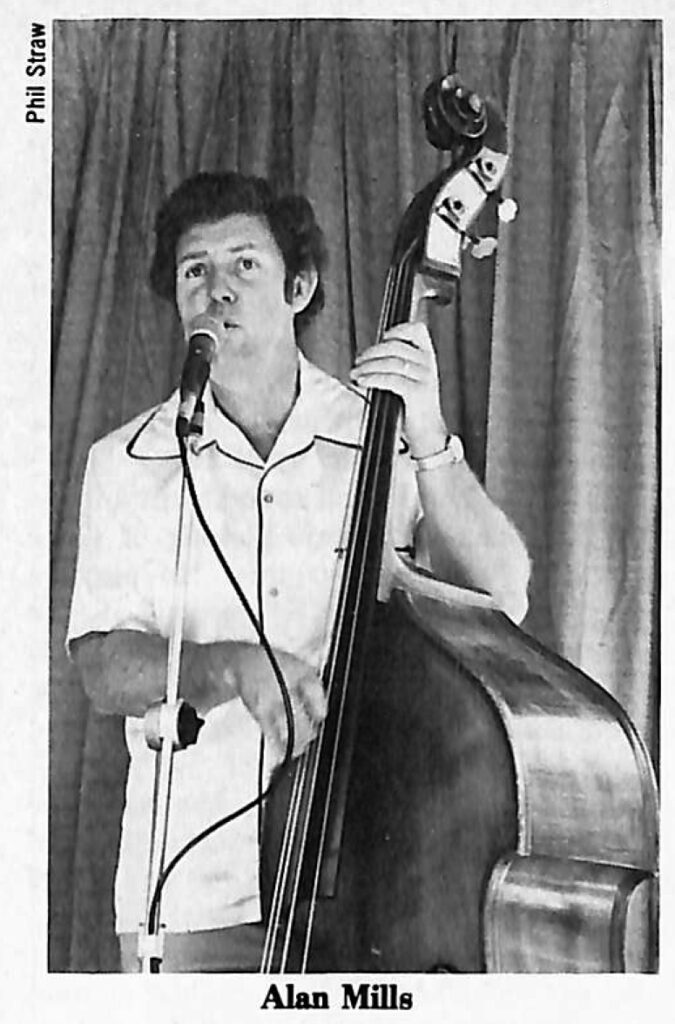
Mills describes their current methods as a culmination of the good things they’ve heard others do. “Our style of music is something we feel,” he explains. “When we listen to other groups, we try to put into (our) music the feelings their music leaves us with.”
Lost and Found members grew up watching the Flatt and Scruggs Martha White television show. They continue to pay homage to it on stage with a complete mini-TV show with Mills coming across as a good Flatt, Parker hitting some Scruggs licks on the banjo and a commercial by “Martha” (Roger Handy).
While Mills has that rare talent of keeping a show going with just the right amount of enthusiasm and breaks in the music, he credits his ability to schoolmaster Lester Flatt.
“He says just enough to introduce anybody, and he’s always so easy going,” Mills relates. “If a snake crawled up on a stage and bit him, he’d probably look down and say, ‘Thank you very much.’ in that easy way he has.” Mills also appreciates the introductory style of Porter Wagoner.
As far as groups go, the Seldom Scene and Country Gentlemen have made considerable impressions on The Lost and Found and they continue to be thankful for what these groups have done to the music. Mills counts one of his greatest thrills as that of singing on stage with John Duffey in August.
Unknowingly, Charlie Monroe also was a great influence on the way The Lost and Found operates. “Monroe never went too far from home, had thousands of friends and made a fortune with his music,” Mills recounts. “Reno and Smiley played good bluegrass but made more stage and personal appearances and sold it more.”
Mills thinks anybody who combines these ideas of friendliness and stage prowess will have to prosper.
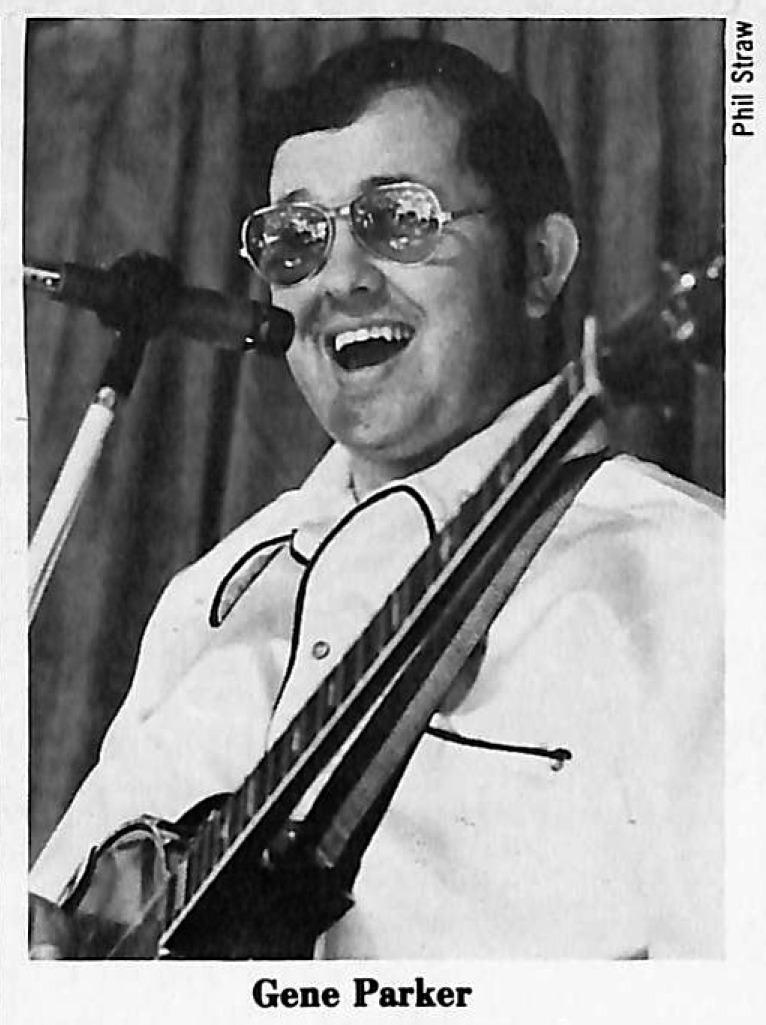
As far as immediate ambitions, manager Mills explains, “TV would be a big help, but stations want to do a Nashville-type show. It’s not that nobody wants to do it, but bluegrass has been pretty much a regional music. Since Bill Monroe and Flatt and Scruggs carried it to the colleges, it’s expanded more. College students now recognize it as a ‘Roots’ kind of music. It’s something everybody feels he can be a part of. Almost anybody can play three chords on a guitar and sing ‘(Roll in My) Sweet Baby’s Arms.’ ”
Although he doesn’t consider himself a writer. Mills has authored several songs. “Just some things I thought fitting to write and sing about.” He prefers songs people can associate with. He feels today’s listeners want to be identified with “a people music-songs that tell of environment and living” and the down-to-earth lyrics with something to say.
Examples of his songs are found on The Lost and Found albums. “The First Time Around,” released by Outlet Records of Rocky Mount, Va., in 1975, includes “If Today was the Last Day” and “Love of the Mountains” written by Mills, and a rousting “Brown Hill,” co-written with Parker about moonshiners in Parker’s section of Franklin County, Virginia.
“The Second Time Around,” a 1976 Outlet recording, includes “Back to the Mountains” composed by Mills.
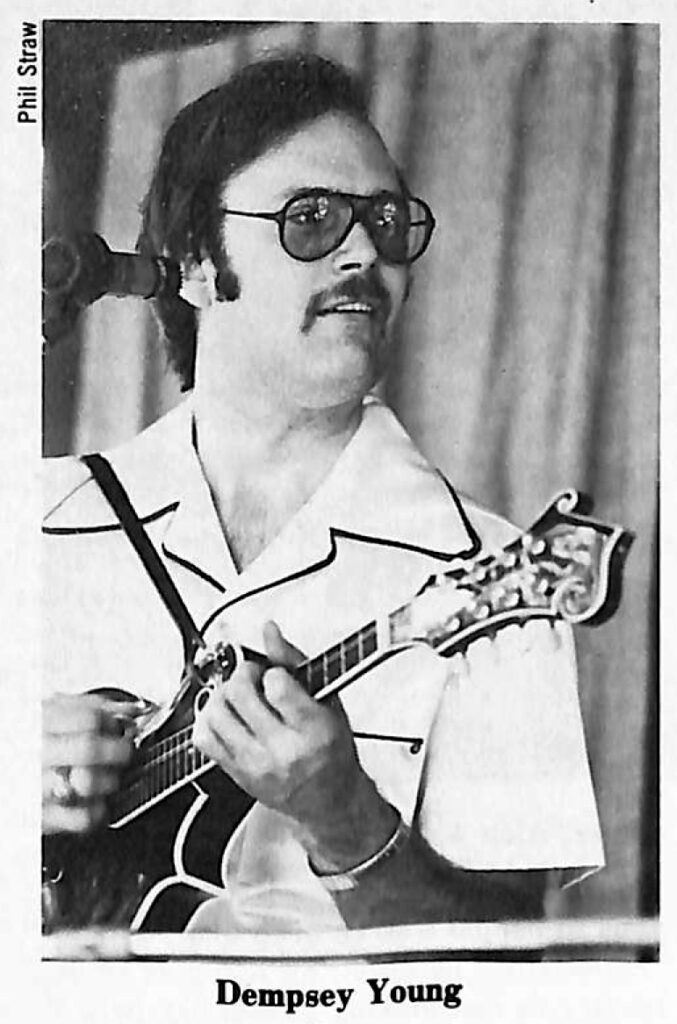
The Lost and Found sound owes a lot to the well-rounded banjo picking of Gene Parker of Henry, Virginia. He plays a hard-driving banjo on several of the group’s arrangements—a good example is “Brown Hill”—but can switch to a smooth, easy-listening style when the occasion calls for it.
Parker has been playing the banjo 20 years. He takes his licks from the likes of Allen Shelton, Don Reno and Earl Scruggs, all of whom he used to listen to regularly. He credits Shelton most because he had a lot of personal contact with him. “He was always willing to show me new licks and tunes that really helped me,” Parker remembers. “I started out like most pickers, trying to play everything note for note like someone else, but I soon got away from doing that and started picking like I thought it should be done.”
Few would doubt Parker’s ability to get all the music possible out of his banjo, but his favorite instrument is the fiddle, which he occasionally plays on stage. An audience-pleasing highlight of The Lost and Found shows is a standard tune, like “Old Joe Clark,” in which Parker and mandolinist Dempsey Young pass the banjo, mandolin and fiddle back and forth in a round robin fashion.
Parker’s original instrumental “Broom- sage” on “The Second Time” album is resonant bluegrass for dyed-in-the-wool fans. He sings a rich baritone, sometimes lead and whatever else is needed on the group’s recordings.
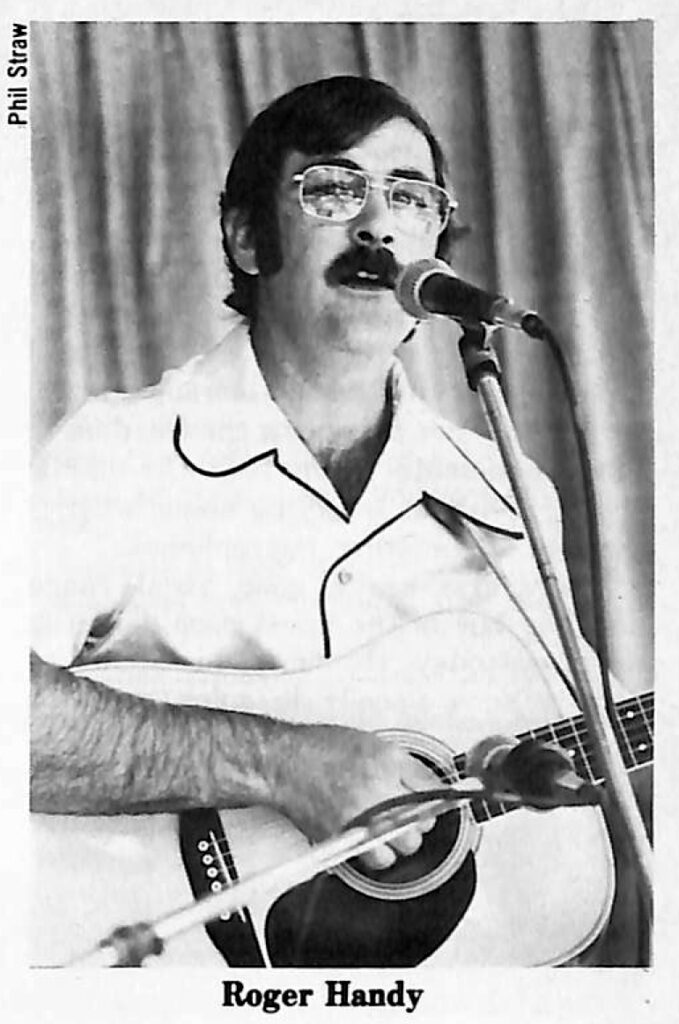
Dempsey Young of Rocky Mount provides a swing-influenced mandolin for the band and sings straight baritone. His background is in rock on the guitar, electric bass and trumpet, but his parents played bluegrass. He has no great idol, but appreciates “any kind of music of it’s played well.”
He is the youngest member of The Lost and Found, but provides them with the most critical evaluation of their performances. He inspires his fellow musicians by striving to play a perfect performance every time.
Manager Mills says Young’s concern for the group’s promotion and perfection has made it easier to maintain The Lost and Founds character. The band depends on his ear for the final production of records and stage numbers.
Young’s song-writing efforts are the instrumental “Dempsey’s Run” on “The First Time” album and “Daddy’s Gone” on “The Second Time.”
He is quick to express thankfulness for the endearing kind of friends he’s made on the music circuit, and credits The Lost and Found’s acceptance in the field to work these people have done.
Rhythm guitar is played by Roger Handy of Ferrum, Virginia. He describes himself as a follow-up man in the band—“always trying to catch the rest of them”—because they’ve all been playing their instruments longer.
With only six years experience on the guitar, Handy still ranks as perhaps the solidest rhythm man among The Lost and Found’s contemporaries. He says Charlie Waller influenced his style “but Gene (Parker) taught me.”
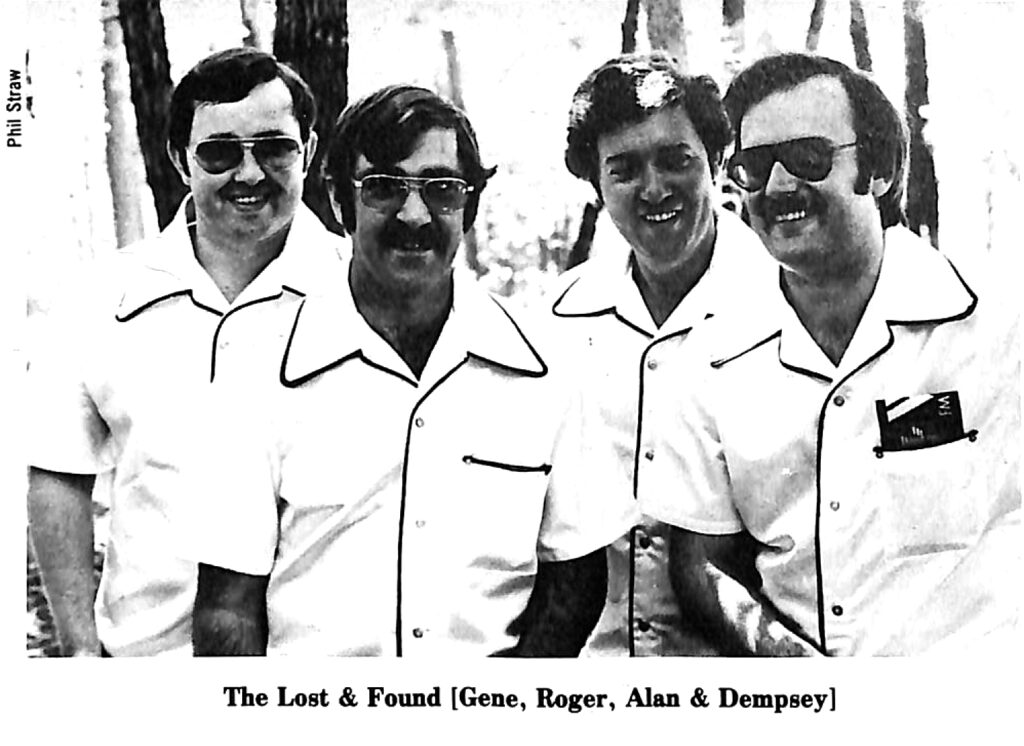
His steady rhythm, evident and necessary on the group’s arrangements, allows the other musicians the freedom to take instrumental journeys in the middle of songs without worrying about what is going on at the other microphones.
Handy also has a good vocal range including one of the finest bass voices in bluegrass today. He shows his ability to carry a song vocally in solos on “The Blizzard” and “Lay it on Jesus,” both on “The Second Time” album.
He contributes The Lost and Found’s accomplishments to manager Mills’ drive and good MC work. Roger notes the real key to their progress has been the fact that “we have disagreements, but not arguments. We respect each other’s opinion and we discuss things.”
In the humble manner of his fellow bandsmen, Handy echoes their thank- yous to people who’ve been nice to them. “Especially,” he says, “for listening to us, feeding us and making us feel like part of the crowd instead of just musicians.”
Like Gene Parker says, “When we’re on the road, we hear a lot of good music and it’s a thrill to get to know the musicians that you hear on record and read about, but the one thing that makes it all worthwhile is the plain, down-to-earth people you meet.”
Share this article
1 Comment
Leave a Comment Cancel Reply
This site uses Akismet to reduce spam. Learn how your comment data is processed.
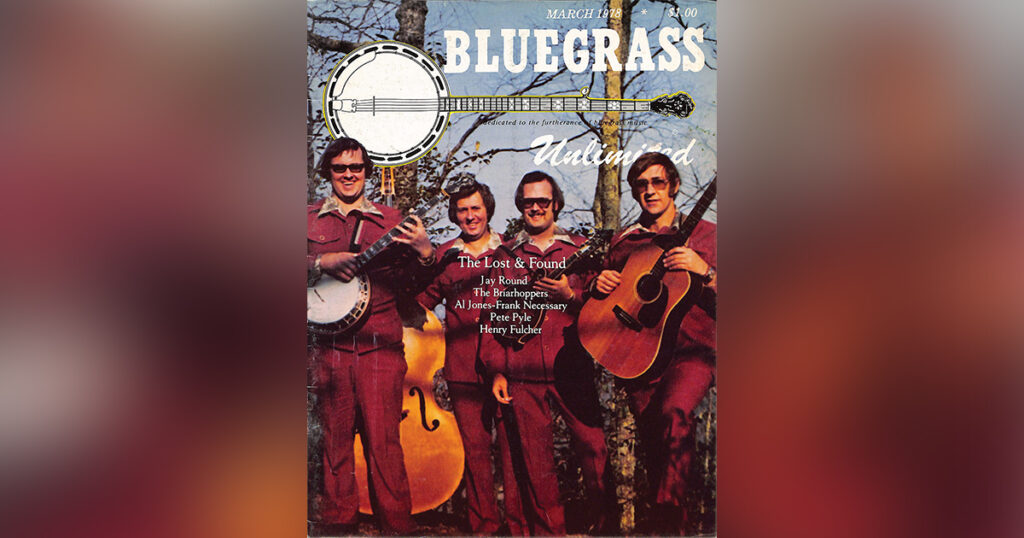
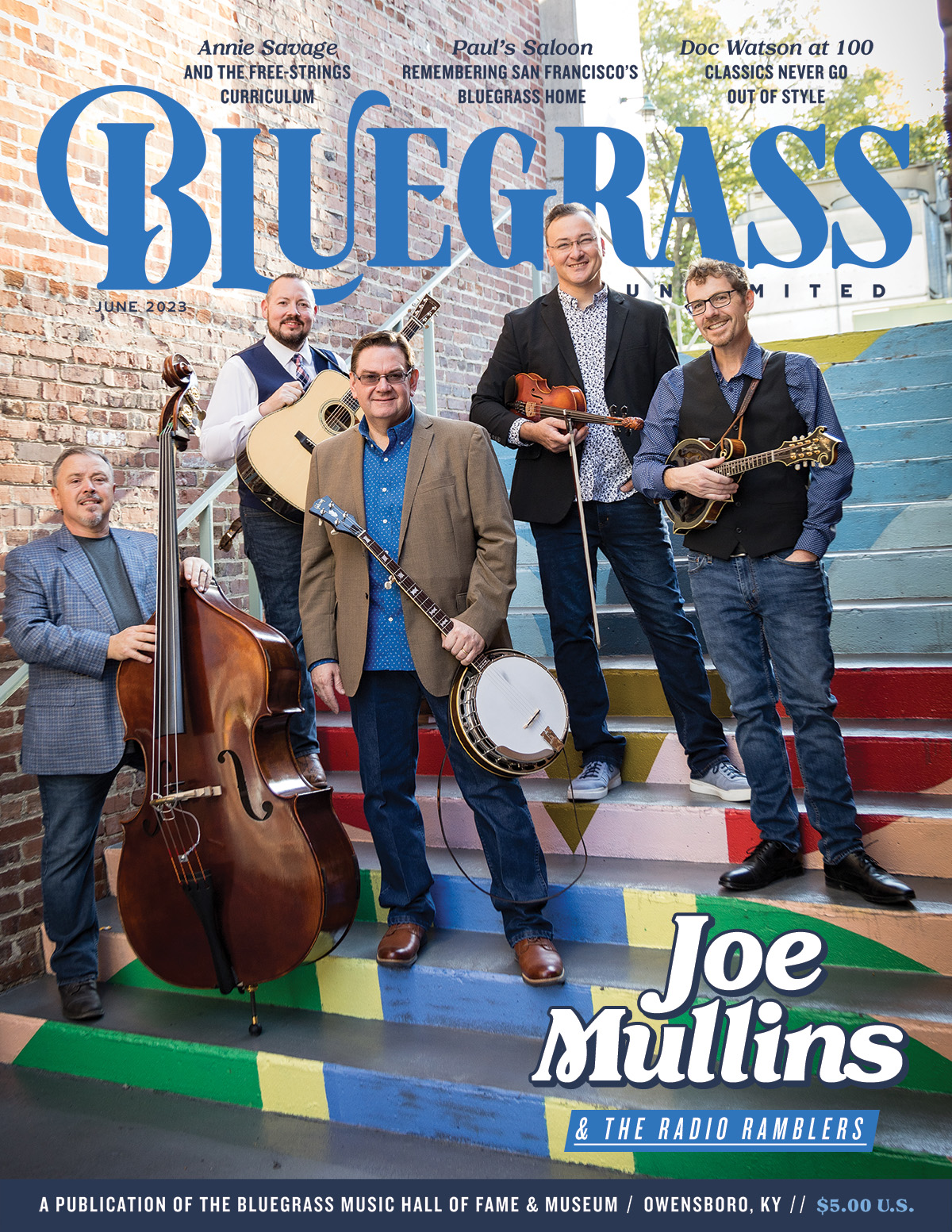
Excellent article. I know all these guys and have jammed with them before. They are all great people. My favorite bluegrass band of all time.